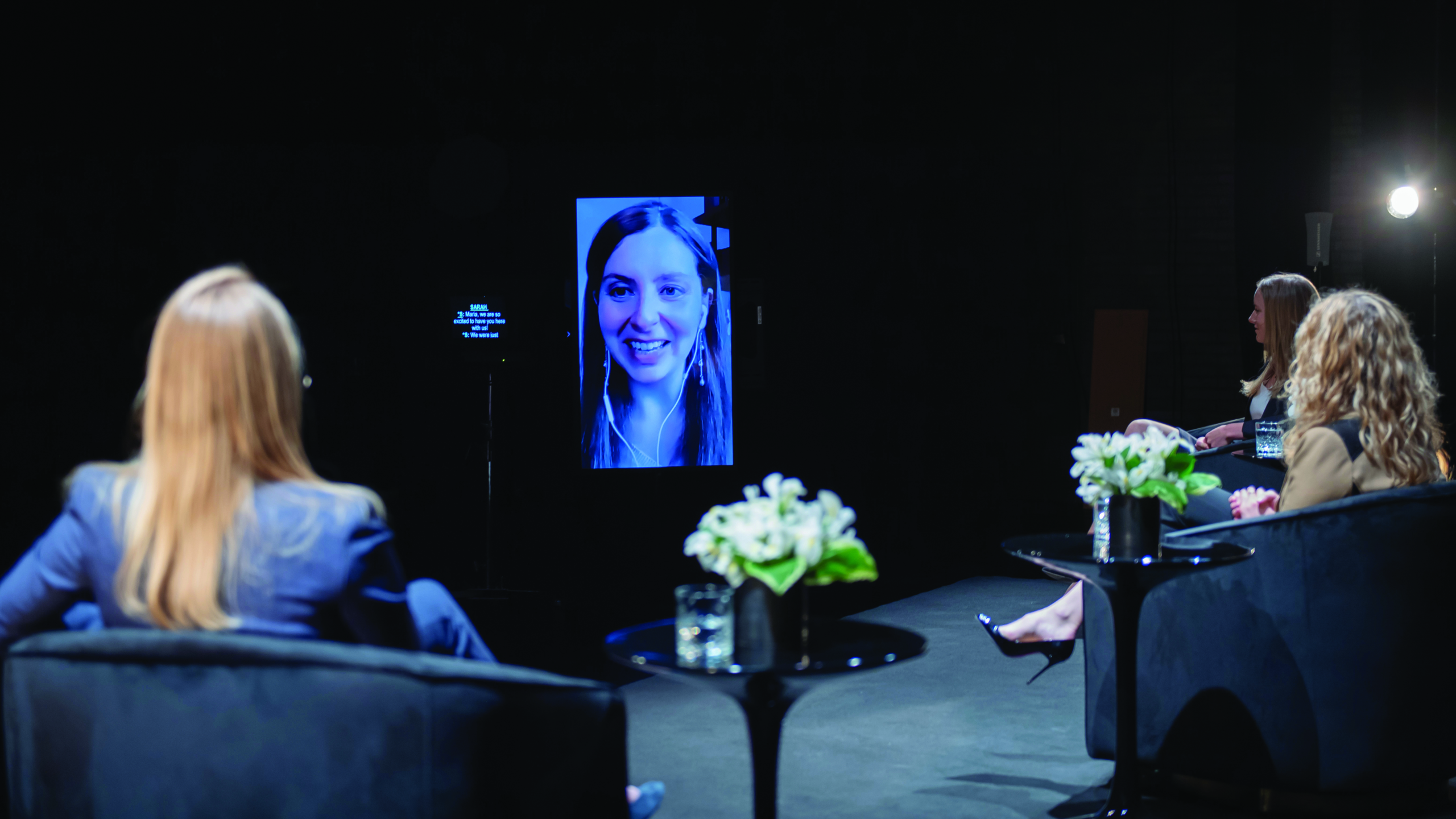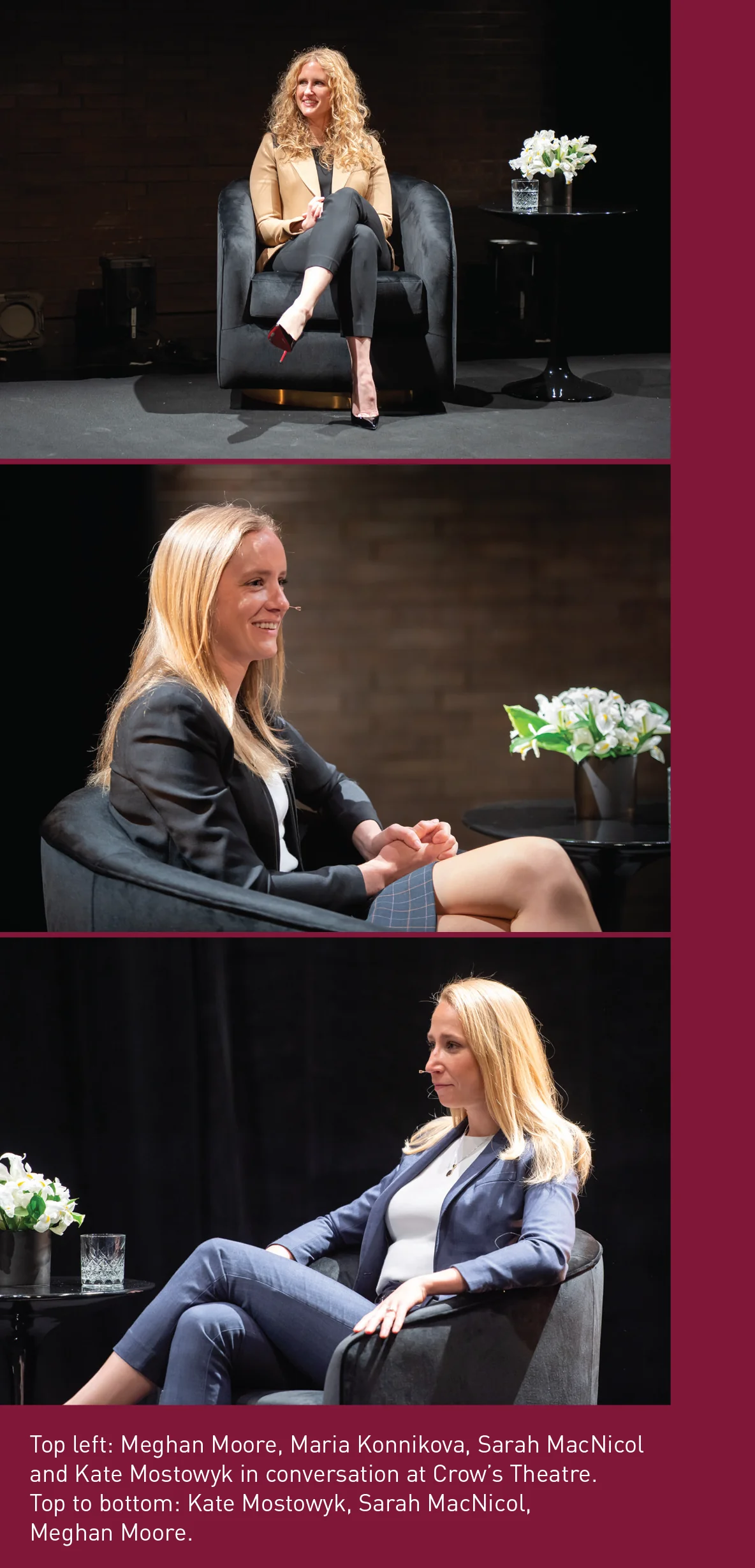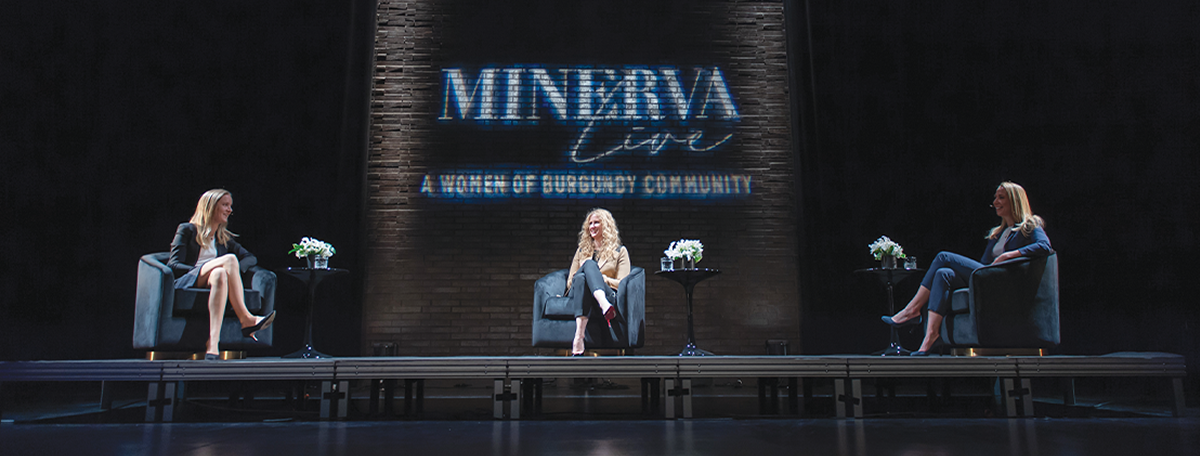In June 2021, the Women of Burgundy Book Club hosted a conversation between Maria Konnikova, PhD. and author of “The Biggest Bluff” and Burgundy’s investment counsellors Meghan Moore, Kate Mostowyk and Sarah MacNicol. Captured here are Maria’s teachings on understanding the role of chance vs. skill in both investing and in life.
Meghan Moore (MM): Your book is about the role of chance in our everyday lives, and how chance had a lot to do with your unconventional journey from writer/psychologist to international poker champion. Please walk us through your story.
Maria Konnikova (MK): Chance plays a huge role in everything that we do. For me, this was true from the earliest part of my life. When I was four, my parents left the Soviet Union and came to the United States, and that had nothing to do with my decision-making. Just think about how different my life would have been if we had stayed in what was then the Soviet Union. This was at the height of communism before the Iron Curtain fell, before the Berlin Wall fell, and no one knew what was going to happen. So, from a very early age, chance played a major role.
While in graduate school pursuing my PhD in psychology, I studied control, the nature of control, and the illusion of control. Over and over, I found that humans will claim agency for things that happen by chance, especially when outcomes are good. Most people’s perception is, “That was all me. I’m so good. I’m so talented.” But I was acutely aware of how important chance is in determining outcomes because of my own background.
In 2015, chance hit me over the head. In the span of a few months, several things happened. I became very sick with an autoimmune condition that nobody could diagnose. I was dealing with fatigue, painful hives, and no answers, and then, suddenly, my grandmother died. She slipped and hit her head. And that was just chance, bad luck. And as all of this was going on, both my husband and my mom lost their jobs. I realized, “I can be really hard working, I can do everything “right.” But I also have to be lucky.” There’s nothing quite like your health failing and all these negative things happening to prove to you how powerful chance is, and how often we just take it for granted when it’s on our side. I wanted to explore this in a deep way and write about it.
Someone recommended I study game theory, which is an interesting framework for looking at chance, and at incomplete information and uncertainty. I read John von Neumann’s Theory of Games and Economic Behavior, which is the foundational text of game theory. John von Neumann was a poker player, and game theory, this entire complex economic theory that defines the 20th century, was born out of poker. Von Neumann thought that poker was the perfect way of understanding strategic decision-making. He reasoned that poker was a game that mirrored life because players are required to act based on incomplete information. There’s no such thing in poker or in life as complete certainty. Everything is a matter of probability. And our goal is to be on the right side of probability, to put ourselves in a position to get lucky, but whether we do or not, is not up to us.
For this reason, I decided I was going to learn to play poker, spend a year immersed in this world, and write about my experience. I planned to use poker as a metaphor for life to explore decision-making and the limits of skill, and to try to figure out the answers to: “How do we learn what we can and can’t control? How do we maximize our skill? How do we minimize those moments when chance is against us and emerge in the best possible shape on the other side?”
Sarah MacNicol (SM): When I think about poker, I think about the statistics and the probabilities behind the hand that you’re dealt. However, your PhD is in the psychology of decision-making, and there are a lot of decisions that need to be made throughout the course of a poker hand. What did you learn from poker that we can apply to our day-to-day decision-making processes?
MK: My big fear when I got into poker was that I was not going to be successful because I don’t have a math background. My coach, Erik Seidel, who’s one of the best poker players in the world, told me that the math is so basic that an elementary school student could do it. He asked, “can you add, subtract, multiply, and divide?” Because at the end of the day, that’s all it is. And he was right.
That helped me because one of the things that you realize is how much your attitude, your psyche, can hold you back. If you’re scared and you think, “I can’t do this. I can’t understand it”, you’ve told your brain you don’t have the skills. But if you say to yourself, “I give myself permission to learn and see what I can do,’” your brain becomes much more receptive. Your mindset is incredibly powerful.
“There’s no such thing in poker or in life as complete certainty. Everything is a matter of probability. And our goal is to be on the right side of probability, to put ourselves in a position to get lucky, but whether we do or not, it’s no longer up to us.”
 One of the things that poker taught me about decision making was how much it matters what you project to others. People don’t know what cards you’re holding. All they can see is what you’re showing them, how you’re acting, your objective actions. That is such an empowering thing when you internalize it because you realize, “I don’t actually have to give all of the information. I don’t have to tell everyone everything I know. I can actually project the confidence that I see in other players at the table.” It made me realize how much my own attitude held me back in real life. My attitude of, “well, my hand’s not that great, so I’m not going to ask for very much.” I think that’s often true for women because that’s how we’re taught to behave in society.
One of the things that poker taught me about decision making was how much it matters what you project to others. People don’t know what cards you’re holding. All they can see is what you’re showing them, how you’re acting, your objective actions. That is such an empowering thing when you internalize it because you realize, “I don’t actually have to give all of the information. I don’t have to tell everyone everything I know. I can actually project the confidence that I see in other players at the table.” It made me realize how much my own attitude held me back in real life. My attitude of, “well, my hand’s not that great, so I’m not going to ask for very much.” I think that’s often true for women because that’s how we’re taught to behave in society.
That’s the emotional side of the decision-making process. I also learned a lot about how to make decisions in a way that’s logical, based in math and the reality of the situation, in observation and asking: “what are all of the factors I need to consider when I’m making this choice?”
The single most important lesson of decision-making that I took away from my research was that it is critical to separate the process of making the decision from its outcome. In real life, we often conflate the two. If something turns out well, we think, “great, good decision.” If something turns out poorly, we think, “oh, bad decision.” And if someone else made the decision, we credit or blame them. What poker teaches you so clearly is that the outcome does not equal the process. In poker, you could be a 75% favourite to win all the time. But 25% of the time you are going to lose. And that doesn’t mean you made the wrong choices.
When people ask me how to improve their decision-making, I urge them to write down the factors that are important, what things matter, and how certain they are of these things. Work it through objectively beforehand, because once you’re in that situation, you’re going to be emotional, and lots of other things will be going on. Crucially, if you don’t write down your framework in advance, you are going to have hindsight bias. You will assess the quality of the decision on the outcome instead of evaluating the process itself.
Kate Mostowyk (KM): One of the biggest challenges we face as investors is to remain disciplined and focused on the long term despite all the noise and things that are out of our control in the short term. How can we apply your learnings to become better long-term investors?
MK: It’s all about process versus outcome. In the immediate term, chance overpowers skill. Anyone can get lucky in one decision, in one hand of poker, in one tournament, in one game, in one investment. And in investments, you often see that when someone gets very lucky early on, others think they’re brilliant. They will have an easy time raising money, because of their early luck. But because of short term thinking, we may reward people for the wrong things. The important thing is to keep in mind is that there’s a huge difference between short and long term.
We also need to realize that we don’t know what chance looks like in real life. It’s so easy to think that 25% means one out of four, right? That if I just lost, then I’m going to win the next three times. That’s not how it works. Probability is not normally distributed in life. It can be completely skewed. If I’m a 75% favourite, I can be stuck in that 25% for a very long time. Probability doesn’t care about me. It doesn’t know who I am. It’s just chance. And this is true in markets too. The markets don’t care that you’re invested in them. They don’t care that you deserve to be lucky. It’s just chance.
One of the most important lessons that my coach Erik taught me about poker, and I think it applies to investing as well, is to make sure you’re properly bankrolled for the long term. That whenever you make a decision, you are in a position to withstand the short term if it is negative. He said, “If you ever actually find that the amount of money is making you evaluate risk differently, you’re playing too high. You’re risking too much. Your bankroll management is incorrect. You should always play so that the stakes don’t matter, so that you can withstand that variance and you can hold when you need to hold, and not be driven by short-term considerations.” I think that’s a powerful lesson for investing. When I was in grad school, I exclusively worked on stock market and investing behaviour. We found that people overtrade all the time. Oftentimes they would have made a lot more money if they just didn’t do anything. They make the mistake of looking at the short term, at spikes, at dips, at how much they’re losing, and how much they’re making. They often ended up selling winners and holding onto losers because of emotional biases. But if you just think long term and think about solid, fundamental decision-making, you can avoid a lot of mistakes.
The long term also means that during your “hold” timeframe new information is going to come in, and the world will change. You have to be willing to update, to realize that the decision that was correct yesterday might not be correct today, might not be correct in two months. That doesn’t make you a poor decision maker or a bad investor. It just means you need to update your decision based on new information.
MM: Behavioural biases are relevant in both poker and investing. What behavioural bias was the hardest for you to overcome when you were playing poker, and how did you eventually conquer it?

MK: For me, one of the hardest ones is the sunk cost fallacy. The sunk cost fallacy is when you feel like you have already committed so much that you must stay, that you can’t walk away, that you’re (in poker terms) “pot committed:” “I’ve already invested so much in this hand that I have to win.” It is something that we do all the time in life. Think about putting good money after bad because you think, “I’ve already invested millions.” Or you put good energy after bad because you think, “I’ve already spent two years on this project.” Companies crash when they continue to invest resources in a product that they’ve been developing for years, even when a competitor has beaten them to market. Rather than abandon and change direction and work on something new, the company decides: “we’re going to finish it anyway, because we’ve already spent multiple years on this.” This happens over and over, and you want to shake them and say, “it doesn’t matter. You can’t get back what you’ve already put in, but you can avoid putting in more.”
I think one of the reasons why sunk cost fallacy bias was difficult for me to overcome, even though I understood it intellectually, was because of a different bias, a bias of risk aversion. I was a more cautious player than most and people were taking advantage of that. I ended up getting into situations where I didn’t have very much bargaining power. I didn’t have many chips because I wasn’t taking enough risk. I would wait for great hands. When I had those great hands, I wanted to play them – I didn’t want to walk away. And what you need to realize is that you have to take more risks and play more hands, not just the “great” ones, so you’re not putting yourself in a situation where you are pressured to stay in. Your hand is only as good as the moment you’re playing it. You need to always be willing to walk away in poker, and in life. You need to always be willing to fold. And that power, the power to fold and knowing when to fold is sometimes what distinguishes the really great players from the not-so-great ones.
KM: One of my favourite moments in the book was when you decided that you want to be known as a good poker player and not a good “female” poker player. What was it like being the only woman at the poker table, and how did you persevere?
MK: At the beginning, I found it incredibly challenging to be the only woman at the poker table. I was quite surprised at my response because I come from the worlds of media and academia, which are also male-dominated environments. And I always thought of myself as a strong, confident woman. But in poker, it is 97-98% male. You can go for days without meeting another woman.
I noticed that my perception of myself as a strong, confident woman took something of a hit and had to be readjusted, because, at the beginning, I was losing money not because I didn’t know what I was supposed to do, but because I couldn’t execute on it. There’s a difference between knowing in theory how you’re supposed to act, and then being able to execute in a way that is believable. If you are scared, everyone’s going to see that. It’s not going to work. It only works if your heart is in it and you believe in what you’re doing. I was unable to execute because I was letting the men at the table bully me and take advantage of me.
Poker is a wonderful teaching environment, because it makes you realize that if you keep letting it get the better of you, you’re going to go broke. No one was paying me to play poker. This was my own money, and so it hurt. I did not realize that I had internalized social biases about how women should and shouldn’t behave. I didn’t realize I wasn’t able to take risk in these situations. The important thing is self-perception and realizing that you have these biases, because then you can begin to work on them.
And what I concluded was that all the men at the table were underestimating me because they weren’t seeing me as a poker player. They were seeing me as a “female” poker player. They didn’t have the experience of playing with many women. So, they had biases about how women play, and they would project them onto me. And when I realized this, I also realized that being underestimated is a superpower. It’s amazing. Because if you’re underestimated, then people don’t know what you’re capable of. They don’t know what you can do. And you can upend their expectations. That’s when I started winning, when I started taking the biases people had against me and using them against them. For example, I played against people who didn’t think that women were capable of bluffing. So, I would bluff them relentlessly. I started betting larger amounts because I realized that every time I bet, they thought, “oh, she must have a great hand because she’s a girl.” When I started to understand all these dynamics, that’s when I was able to flip the gender bias and use it to my advantage, realizing the superpower of being a woman.
This post is presented for illustrative and discussion purposes only. It is not intended to provide investment advice and does not consider unique objectives, constraints or financial needs. Under no circumstances does this post suggest that you should time the market in any way or make investment decisions based on the content. Select securities may be used as examples to illustrate Burgundy’s investment philosophy. Burgundy funds or portfolios may or may not hold such securities for the whole demonstrated period. Investors are advised that their investments are not guaranteed, their values change frequently and past performance may not be repeated. This post is not intended as an offer to invest in any investment strategy presented by Burgundy. The information contained in this post is the opinion of Burgundy Asset Management and/or its employees as of the date of the post and is subject to change without notice. Please refer to the Legal section of this website for additional information.

